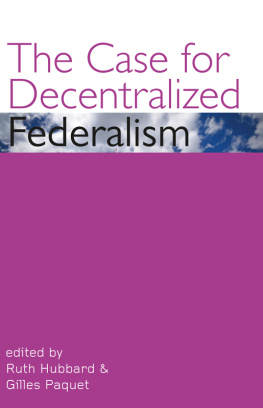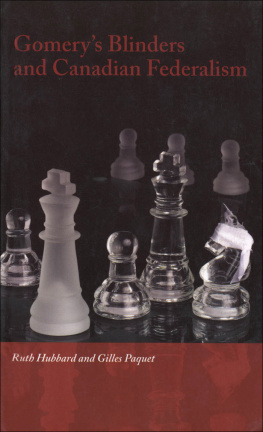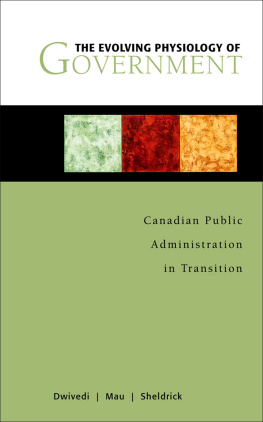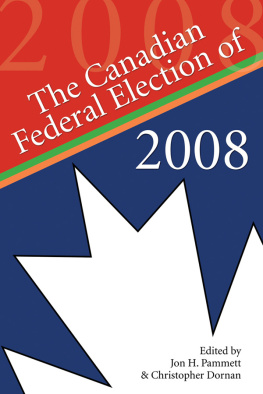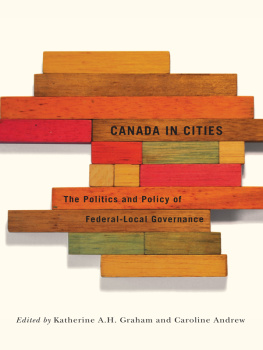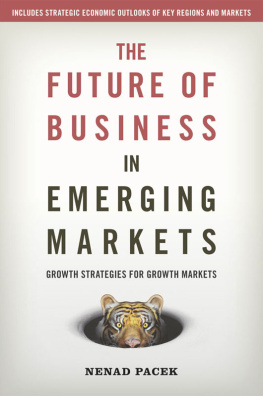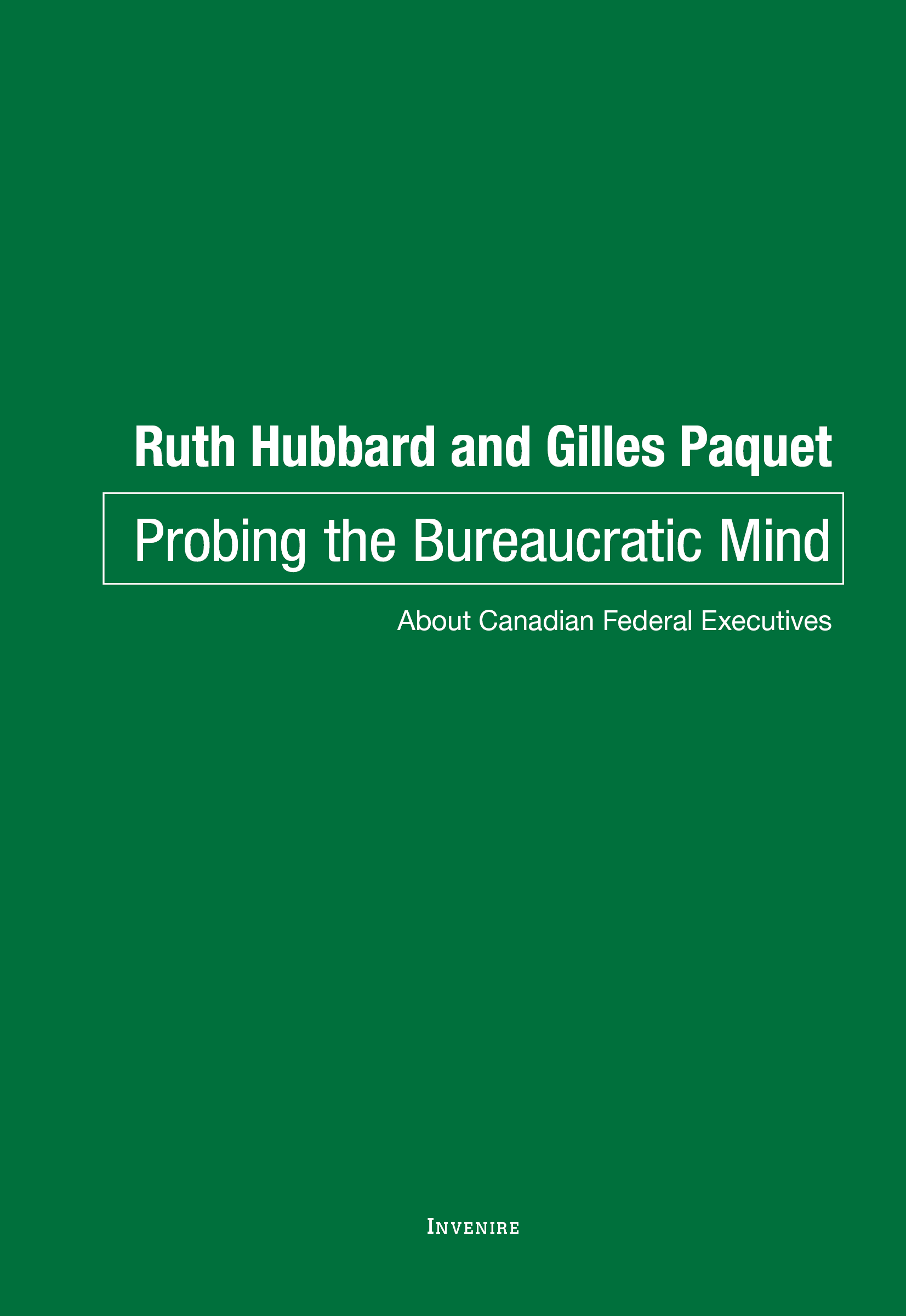Ruth Hubbard and Gilles Paquet
Probing the Bureaucratic Mind
About Canadian Federal Executives
| Collaborative Decentred Metagovernance Series
T his series of books is designed to define cumulatively the contours of collaborative decentred metagovernance. At this time, there is still no canonical version of this paradigm: it is en mergence . This series intends to be one of many construction sites to experiment with various dimensions of an effective and practical version of this new approach.
Metagovernance is the art of combining different forms or styles of governance, experimented with in the private, public and social sectors, to ensure effective coordination when power, resources and information are widely distributed, and the governing is of necessity decentred and collaborative.
The series invites conceptual and practical contributions focused on different issue domains, policy fields, causes clbres , functional processes, etc. to the extent that they contribute to sharpening the new apparatus associated with collaborative decentred metagovernance.
In the last few decades, there has been a need felt for a more sophisticated understanding of the governing of the private, public and social sectors: for less compartmentalization among sectors that have much in common; and for new conceptual tools to suggest new relevant questions and new ways to carry out the business of governing, by creatively recombining the tools of governance that have proven successful in all these sectors. These efforts have generated experiments that have been sufficiently rich and wide-ranging in the various laboratories to warrant efforts to pull together what we know at this stage.
This sixth book in the series reports on conversations with a large sample of senior executives in the Canadian federal public service. We attempted to probe their way of tackling progressively more and more difficult problems in order to gain a sense of the weaknesses that these conversations revealed about the capabilities of the federal public service to respond to current challenges, and of what might be done to kick start a process of refurbishment of these capabilities.
Interested parties are invited to join the Chautauqua.
Editorial Board
Other titles published by Invenire are listed at the end of this book.
Ruth Hubbard and Gilles Paquet
Probing the Bureaucratic Mind
About Canadian Federal Executives
Invenire
Ottawa, Canada
2014
Invenire 2014
Library and Archives Canada Cataloguing in Publication
Hubbard, Ruth, 1942-, author
Probing the bureaucratic mind : about Canadian federal
executives / Ruth Hubbard and Gilles Paquet.
Includes bibliographical references.
Issued in print and electronic formats.
ISBN 978-1-927465-12-7 (pbk.).--ISBN 978-1-927465-13-4 (html)
1. Government executives--Canada. 2. Government executives--Canada--Attitudes. 3. Civil service--Canada. 4. Critical thinking--Canada. 5. Problem solving--Canada. 6. Learning ability. I. Paquet, Gilles, 1936-, author II. Title.
JL111.E93H83 2014 352.3'90971 C2014-901134-2
C2014-901135-0
Invenire would like to gratefully acknowledge the ongoing support for this series by the Centre on Governance, University of Ottawa.
All rights reserved. This book may not be copied or stored in any information retrieval system, in whole or in part, without the written permission of the copyright owner.
Published by Invenire
P.O. Box 87001
Ottawa, Canada K2P 1X0
www.invenire.ca
Cover design by Sandy Lynch
Layout and design by Sandy Lynch
Printed in Canada by Imprimerie Gauvin
Distributed by:
Commoners Publishing
631 Tubman Cr.
Ottawa, Canada K1V 8L6
Tel.: 613-523-2444
Fax: 888-613-0329
sales@commonerspublishing.com
www.commonerspublishing.com
| Introduction
Forget the names, remember the stories.
Charles Handy
P ublic administration is a complex affair of mnage trois . It pertains to the interactions among elected officials, bureaucrats and citizens in the face of various challenges, ranging from the need to ensure stability in the provision of public goods required by the citizens, to the obligation to improvise and innovate in refurbishing the stewardship of the public household to redesign new frames of reference because the socio-economy is being transformed. There are a lot of subsidiary characters holy and unholy carousing around the main actors and pretending to add value to the game. Some perform useful intermediation services; others are agents of distortion and value reducing.
This on-going game, striving to elicit the most effective wayfinding in the face of uncertainty, and in sometimes hostile territory, is too often represented in the crudest of ways by the media as some form of commedia dellarte , or as some solemn organization charts created by political scientists. These sorts of cartoons provide neither a fair representation of the subtle ways in which these groups, their organizations and their institutions think and interact, nor a meaningful explanation of their actions.
In Canada, there have been too few successful attempts to probe the minds of politicians, of bureaucrats or of citizens to really make sense of how they think. Whatever probing there has been has too often been shoddy and ideological: the epigones of one tribe or the other arguing some sort of superiority (and therefore some hegemony) over the other two. Values and rationalities have been merrily postulated for one group or the other, with occasional vindication by questionnaires inviting the most grievous self-promotion. However, there has been little appetite for vindication of these claims. All parties have felt comfortable with whatever presumptions conveniently fit their needs in the particular analysis.
These forays have not cast much light on the sources and causes of the failure to evolve forms of coordination (conventions, norms, rules, organizations and institutions) capable of generating the requisite social learning, resilience and capacity to transform what would seem to be required in the public administration of our modern socio-economics. Yet some of these sources and causes of failure have to do with the poverty of mind of one group or the other.
Meaningful mind-probing cannot be satisfied with some over-simplistic depiction of the mindsets of the three groups: politicians as dummies whose policy decisions are guided by anecdotes; bureaucrats as technical experts blinkered by disciplinary blinders, and yet, at senior levels, claiming to know more about what should be done, and to be more legitimate than elected officials; and self-righteous, poorly informed entitlement-inspired citizens, always demanding more but willing to pay ever less, and complaining bitterly about the incapacity of the other two groups to work together to meet their unreasonable expectations.
It has always been our view that neither such derogatory caricatures nor the opposite celebratory, self-adorning, promotional statements by office-holders produce reliable images of the central actors mindsets. What are needed are occasions when these different groups can reveal indirectly and unwittingly, through conversations about issues of consequence, their capabilities and incapabilities for the ways and means of dealing with them.
This short book, using such an oblique approach, aims at correcting some of the misapprehensions in good currency related to the bureaucratic mindset of Canadian federal senior executives in the early 21 st century.
Our reason to start with this group is simply that we are most familiar with it. One of the authors is a senior career public servant (Ruth Hubbard) who served for more than a decade as deputy minister at the federal level in Canada, and was president of the Public Service Commission of Canada. Since retirement, she has been involved in coaching senior public servants in Ottawa. The second is a senior academic and journalist who has spent a considerable amount of time writing about the federal public service, has received a Citation for Public Service by the Association of Public Executives of the Government of Canada (APEX) for this work, and has been involved in professional development for public sector executives in the last few decades.


